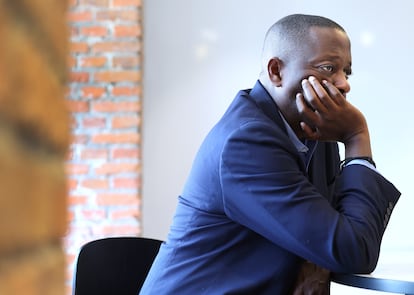Garth Graham, director of YouTube Health: ‘Misinformation around vaccines is still very high’
Health-related queries on online platforms have skyrocketed since the Covid pandemic, according to the director and head of YouTube Health, Garth Graham (Kingston, Jamaica, 1975). In Spain, where he sat down for this interview, these searches grew by 20% last year. Graham was in Madrid to present the new YouTube functionalities aimed at guiding people towards authoritative sources to get credible information about sensitive issues such as mental health and cancer, where there has been a rise in queries, and to help users navigate the large amount of misinformation that can be found on the internet.
Graham has worked at some of the world’s top institutions. Trained in Medicine at Yale University (where he completed his undergraduate and PhD studies), his resume includes a Cardiology fellowship at one of the most prestigious medical centers in the world, Johns Hopkins, and an extensive career in both public health service and in the private sector. His current focus since he joined Google as director of YouTube Health in 2020 is twofold: on the one hand, the fight against the growing misinformation on health issues and, on the other, helping to achieve health equity.
Question. Why did you decide to create this feature to help people find authorized health sources in Spain?
Answer. Last year, the number of queries on our platform on health topics grew by 20% in Spain, reaching 8.5 billion views of videos dealing with these issues. Although it is true that, in general, it is a great challenge throughout the world, since there are many places where you can find misleading or incorrect information. For us, tackling misinformation is a challenge, since it is something that we face both in public health, in general, and in health issues, in particular.
Q. What does this new feature specifically offer?
A. This global YouTube Health effort revolves around creating partnerships that help provide people with high-quality health information, that is, information based on authoritative sources, such as the World Health Organization or the National Academy of Medicine Challenge in the United States. To achieve this quality information, we have established collaborations with various public and private Spanish hospitals and health institutions.
Last year we launched initiatives to combat misinformation about miracle cures
Q. What are the specific problems you have detected regarding misinformation in the health field?
A. There are a couple of areas that stand out above the rest. One of them is misinformation around vaccines, something we saw a lot of during the Covid-19 pandemic and which is still very high after it. Another problem that we see, in terms of misinformation, is miracle cures. These are remedies that can divert people from finding the right cure for their problems. That’s why last year we launched initiatives to combat misinformation around miracle cures, especially about cancer.
P. As a doctor, why do you encourage people to look for information online instead of directly advising them to go see a specialist? Each case is unique.
A. YouTube is a great place to get health information and answer some questions, but it’s not a substitute for seeing your doctor. It’s important for patients and members of our community to continue seeing their doctor and to use platforms like ours to get health information either as a supplement to their doctor’s visits or when they need to find additional information that may be helpful in their treatment.

Q. What type of content will you generate that can help patients or their families?
A. We generate health information that seeks to answer the most common questions that people ask on YouTube about their health. To do this, in Spain we work, for example, in collaboration with the Gregorio Marañón Hospital and other public and private centers that are also making an effort in this regard. These collaborators work on the ground and are well aware of the questions that most concern people about their health and can provide the most precise answers because they know the environment in which people ask them.
Q. What are the most frequently consulted topics by Spanish YouTube users?
A. People are looking for a lot of information about cancer, but also about diabetes, depression or anxiety. But we see that concern about these diseases is common all over the world. That’s why it’s important that when they look for answers on platforms like YouTube, we provide them with high-quality, evidence-based health information and that the answers to their questions come from credible institutions that have provided us with the information.
“It is important to fight against misinformation in health”
Q. One of the aims of this project is to provide tools that aim to take care of the mental health of young people in particular. Why?
A. We need to make sure that we take steps to make young people safe on our platform. We have put in place initiatives around, for example, eating disorders, so that young people are not exposed to information that may have a negative consequence for them, even if it doesn’t have one for an adult.
Q. Another feature is patients sharing their experiences. How will you manage this content while conveying the message of each particular case?
A. What we do is highlight patients’ stories about their experience so that other patients can learn from it. And when they look for that information, it will reflect that these are general experiences. Another thing that we think is important is that people hear all the different versions, that they get information from different sources, it’s vital to fight misinformation.
Q. YouTube and Google have moved from being search engines to being content organizers and creators, whereas before they were simply distributing content. Is there a social responsibility behind this change and is it not just a matter of business criteria?
A. Yes, there is. We want the community and users to know that we are acting and promoting things focused on their best interest. It is certainly good from a business angle as well, because as people understand that we are acting responsibly, that helps build engagement and trust between the platform and people. When content comes from a credible source, we tag it and communicate it that so that if people want more information, they can click on that link.
Q. Another issue that has been of great concern since the Covid-19 pandemic is mental health. Has this been reflected in searches on your platform?
A. Yes, it is an important topic, I would say all over the world, during the pandemic, afterwards and also now. Since then, people have been more interested in understanding their own mental health. In Spain, there were more than 300 million views of videos on this subject last year, which is a lot for mental health content.
Q. Are the viewers usually patients, people who suffer from these problems?
A. People are coming to the platform looking for health information that they used to get from other people or through other means. Some are looking to learn about a problem that may not affect them, but they are interested in understanding more about a particular area. And then, of course, there are people who are looking for answers because they are experiencing the problem themselves and want to have more information. So I think there is a need for hospitals and other healthcare institutions to really get involved where the patients are and develop information that they can easily access.
Q. With artificial intelligence (AI), there is a growing need globally to guide people so that they do not fall for biased information. What role does YouTube want to play with regard to health information?
A. When we build this health tool, we use AI to refine information, so AI allows us to work in many ways to get better quality information. But we also have to have strategies to mitigate many of the risks that AI introduces. So it’s vital to create strategies to address challenges and misinformation, which AI is also often used to address.
Sign up for our weekly newsletter to get more English-language news coverage from EL PAÍS USA Edition


